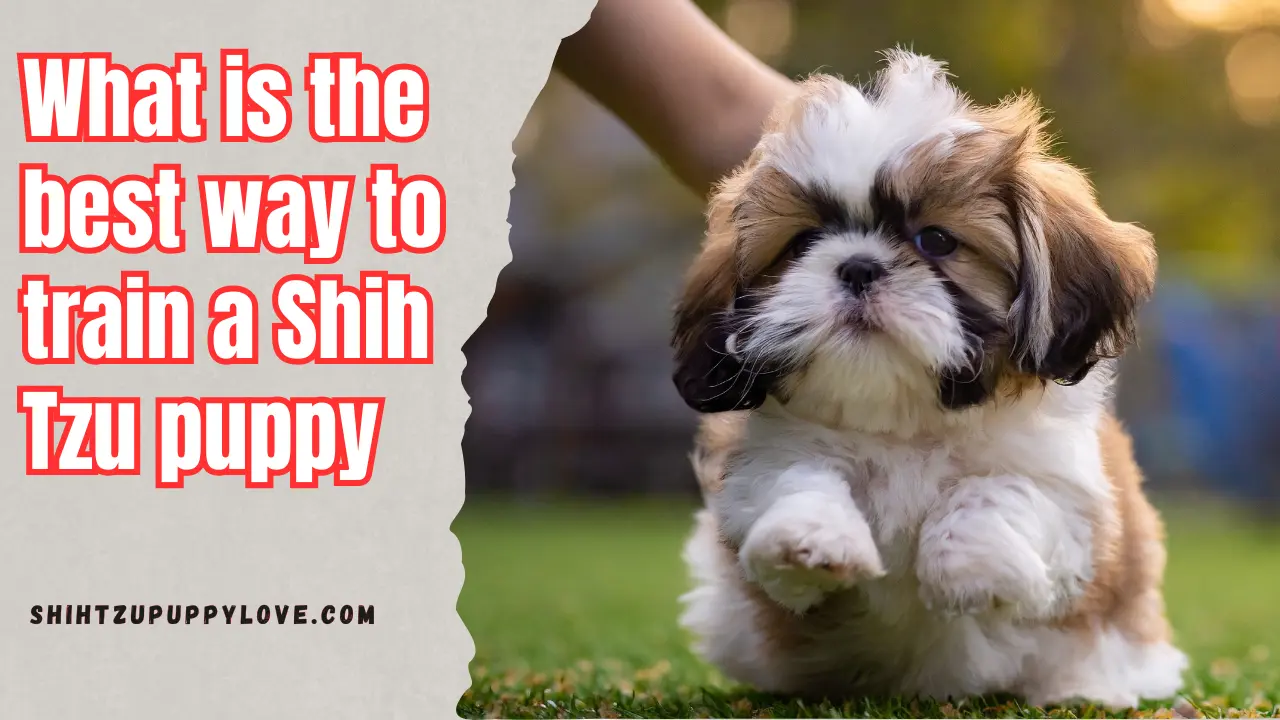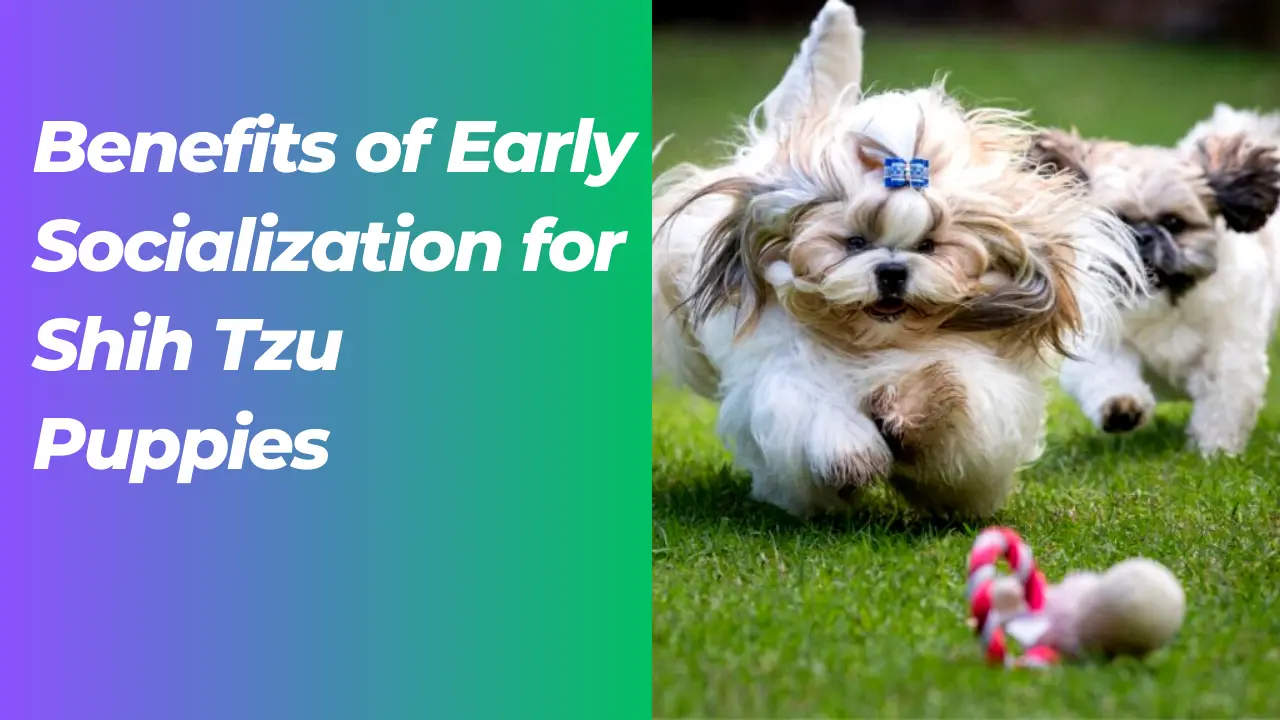What is the best way to train a Shih Tzu puppy in 2023
What is the best way to train a Shih Tzu puppy?
Welcome to our blog post on the best way to train a Shih Tzu puppy! If you’ve recently brought home an adorable little ball of fluff and are wondering how to instill good behavior and obedience in your furry friend, you’re in the right place. Training a Shih Tzu puppy is not only important for their overall well-being but also sets the foundation for a happy and harmonious relationship with your new companion. In this article, we’ll explore effective training methods, socialization techniques, housebreaking tips, and much more. So let’s dive right in and discover how to unlock your Shih Tzu’s full potential together!
Understanding the Shih Tzu breed
Understanding the Shih Tzu breed is essential before embarking on their training journey. These adorable little dogs have a rich history and unique characteristics that make them stand out among other breeds.
Regular Grooming:
Shih Tzus are known for their luxurious, long coats that require regular grooming to keep them looking their best. They were originally bred as companion dogs for Chinese royalty, which explains their regal demeanor and affectionate nature.
One important aspect of understanding the Shih Tzu breed is recognizing their independent streak. While they may be small in size, these dogs have big personalities and can sometimes be stubborn during training sessions. Patience and consistency are key when working with your Shih Tzu puppy.
Separation Anxiety:
Shih Tzus thrive on human companionship and can easily bond with their owners. This means they can suffer from separation anxiety if left alone for long periods. Providing enough love, attention, and mental stimulation will help prevent behavioral problems associated with separation anxiety.
Understanding the Shih Tzu breed will allow you to tailor your training style to their specific needs. By becoming aware of their traits and tendencies, you will be better equipped to develop a strong bond with your furry friends and guide them to become dynamic members of your family.
Importance of early training for Shih Tzu puppies
Early training for Shih Tzu puppies is very important to ensure that they grow up to be well-behaved and confident dogs. Starting their training at a young age helps them develop good habits, manners, and social skills that will benefit them throughout their lives.
Shih Tzus are intelligent and eager to please, making them quick learners. By starting training early, you can take advantage of their natural curiosity and desire to learn. This allows you to positively shape their behavior from the start.
Positive reinforcement is an effective way to train a Shih Tzu puppy. Rewarding desired behavior with treats or praise encourages them to repeat those actions. It is important to be patient and consistent during this process, as it may take time for your dog to understand what you are asking of them.
Socialization is another important aspect of early training for a Shih Tzu puppy. Exposing them to different people, animals, environments, and situations helps build their confidence and reduces the chances of fear or aggression problems later.
The early stages of your Shih Tzu’s development should include obedience training. Teaching basic commands like sit, stay, come and heel lays a foundation for more advanced obedience work in the future.
Housebreaking is often one of the first challenges when bringing home a new puppy. Consistency is key when teaching your Shih Tzu where it is appropriate to eliminate waste. Creating a designated potty area outside or using an indoor pepad can help establish good habits quickly.
It is important to focus not only on obedience but also on common behavior problems with your Shih Tzu dog such as excessive barking or furniture chewing. Redirecting these behaviors with appropriate toys or using deterrents can help effectively change unwanted behaviors.
Successful training involves building trust between you and your Shih Tzu puppy through positive experiences. Spend quality time with your dog through play, grooming, and gentle handling. It will not only strengthen.
Positive reinforcement training methods
Positive reinforcement training methods are a very effective and humane way to train Shih Tzu puppies. This approach focuses on rewarding desired behaviors rather than punishing undesirable ones. By using positive reinforcement, you can build a strong bond with your dog and make the learning process enjoyable for both of you.
An important aspect of positive reinforcement training is the use of rewards such as treats, praise, or playtime to reinforce good behavior. When your Shih Tzu follows a command or performs a desired behavior, immediately reward it with something you value. This helps them realize that their actions lead to positive outcomes.
Consistency is very important when using positive reinforcement techniques. Make sure everyone in the household is on the same page and using consistent commands and rewards. It’s also important to be patient and provide clear cues so your dog understands what you expect from him.
Another effective method is clicker training, which involves using a small handheld device that produces a clicking sound when pressed. The click serves as an immediate cue for the correct behavior, followed by a reward. Over time, your Shih Tzu will associate the sound of the clicker with receiving a reward.
In addition to rewards, it is important to redirect unwanted behaviors by offering alternative activities or distractions. For example, if your dog starts chewing on furniture, carefully remove him from the area and offer him an appropriate chew toy.
Remember that every dog learns at its own pace, so be patient and understanding during the training process. Celebrate every little success along the way!
Positive reinforcement works wonders not only for obedience training but also for social purposes. Use treats and praise to encourage friendly interactions with other dogs and people while ensuring these encounters are always safe and under control.
By using consistent positive reinforcement methods throughout your Shih Tzu’s life, you will create an environment where learning becomes fun for both of you. So get these things and start building a strong foundation of trust between you and your furry friend. Happy training!
Socialization and obedience training for Shih Tzu puppies
Socialization and obedience training are essential for Shih Tzu puppies to grow into well-rounded and obedient adult dogs. Early socialization helps them become comfortable with different environments and with different people, animals, and situations. It is important to expose your Shih Tzu puppy to a wide range of experiences from an early age.
Introduce your dog to new sights, sounds, smells, and textures in a positive way. Take him regularly to parks or busy streets where he can meet other dogs or people. This exposure will help prevent later fear-based aggression or anxiety.
Obedience training should begin as soon as you bring your Shih Tzu puppy home. Start with basic commands like “sit,” “stay,” and “come.” Use positive reinforcement techniques such as treats, praise, and rewards when they follow commands correctly. Consistency is key – practice these commands daily in short sessions so your child understands what is expected of him.
Enroll your Shih Tzu puppy in a puppy kindergarten class where he can interact with other children his age while learning basic manners under the guidance of professional trainers. These classes provide structured socialization opportunities with valuable obedience training exercises.
Remember that every dog learns at its own pace, so be patient throughout the process. Be consistent with training methods and regularly reinforce positive behaviors. By investing the time and effort into socializing and obedience training your Shih Tzu puppy early on, you are setting them up for a lifetime of happiness together!
Housebreaking a Shih Tzu puppy
Housebreaking a Shih Tzu puppy can be a challenging task, but with patience and consistency, it is achievable. One important thing to remember is that puppies have small bladders, so they will need frequent potty breaks.
Start by establishing a routine for your puppy. Take them outside to their designated potty area first thing in the morning, after meals, naps, and playtime. This will help them understand when and where they are supposed to go.
When you take your puppy outside, choose a specific command or phrase to associate with pottying such as “go potty” or “do your business.” Use this command consistently every time you take them out so they begin to understand what it means.
Reward your Shih Tzu puppy with praise and treats immediately after they finish eliminating in the correct spot. Positive reinforcement goes a long way in reinforcing good behavior.
Accidents are bound to happen during the housebreaking process. If you catch your puppy in the act of having an accident indoors, calmly interrupt them without scolding or yelling. Quickly take them outside to their designated spot so they can finish there.
It’s important not to punish or rub their nose in accidents as this can create fear or confusion for your pup. Instead, clean up any messes thoroughly using enzymatic cleaners specifically designed for pet stains and odors.
Consistency is key when housebreaking a Shih Tzu puppy. Stick to their established routine even on weekends or during busy days. With time and effort invested into training, your furry friend will soon learn where it’s appropriate to do their business!
Crate training and potty training tips
Crate training and potty training are essential aspects of raising a Shih Tzu puppy. The crate serves as their safe space, providing security and helping with housebreaking.
When introducing your puppy to the crate, make it inviting by adding comfy bedding and toys. Start with short periods in the crate and gradually increase it. Remember that consistency is key here – always reward your puppy for going into the crate voluntarily.
Potty training can be challenging but following a routine will help tremendously. Take your pup outside after meals, naps, playtime, or every few hours initially. Use positive reinforcement when they eliminate outside by praising them or offering treats.
Accidents may happen during training, so patience is crucial. Never punish your puppy for accidents; instead, clean up without making a fuss. Stay vigilant and learn to recognize signs that indicate they need to go out – pacing, sniffing around, or circling are common signals.
Remember: successful crate training and potty training require time, consistency, patience, and positive reinforcement techniques!
Socialization for a well-rounded Shih Tzu puppy
Socialization is a crucial aspect of training for any puppy, and Shih Tzu puppies are no exception. It involves exposing your furry friend to various people, animals, environments, and experiences to ensure they grow up to be well-rounded and confident dogs.
Start socializing your Shih Tzu puppy as early as possible. Introduce them to family members, friends, and neighbors who can provide positive interactions. Encourage gentle handling by different individuals to help them become comfortable with being touched.
Take your puppy on walks in different settings such as parks or busy streets so they can encounter new sights, sounds, and smells. Gradually increase the level of exposure but always prioritize their safety.
Arrange playdates with other friendly dogs or enroll them in puppy classes where they can interact with fellow pups under professional supervision. This will teach them how to communicate appropriately with others in a controlled environment.
Expose your Shih Tzu puppy to various objects like bicycles, vacuum cleaners, car rides – anything that may be part of their future daily life. Positive associations during these encounters will help prevent fear or anxiety responses later on.
Remember that socialization should be an ongoing process throughout their lives. Regularly expose your adult Shih Tzu dog to new experiences and reinforce positive behavior whenever possible.
By prioritizing socialization from an early age onwards, you’ll set the foundation for a confident and happy Shih Tzu companion!
Dealing with common behavior problems in Shih Tzu puppies
Shih Tzu puppies are adorable and lovable, but like any other breed, they can also exhibit some common behavior problems. It’s important to address these issues early on to ensure a well-behaved and happy pup.
One common problem is excessive barking. Shih Tzus are known for their vocal nature, but if your puppy’s barking becomes incessant or disruptive, it’s time to take action. Start by identifying the trigger for the barking and then work on desensitizing your puppy through positive reinforcement training techniques.
Another issue that may arise is separation anxiety. Shih Tzus are companion dogs who thrive on human interaction, so being left alone can be distressing for them. Gradually acclimating your puppy to being alone for short periods and providing them with engaging toys or treats can help alleviate this anxiety.
Housebreaking accidents can also be a challenge with Shih Tzu puppies. Consistency is key here – establish a routine for potty breaks and reward your pup when they are eliminated in the appropriate spot. Avoid punishing accidents as it may create fear or confusion.
Some Shih Tzus may also display stubbornness during training sessions. Patience is essential – use positive reinforcement methods such as treats, praise, and consistency in commands to motivate your pup to cooperate.
Remember that every dog is unique and may require different approaches when dealing with behavior problems. If you’re struggling with any specific issue or need additional guidance, don’t hesitate to seek advice from a professional trainer or veterinarian who specializes in small breeds like the Shih Tzu.
By addressing these common behavior problems early on and using positive reinforcement training techniques consistently throughout your puppy’s life, you’ll set them up for success as they grow into well-mannered adult dogs!
Maintaining consistent training as your puppy grows into an adult
As your Shih Tzu puppy grows into an adult, it’s important to maintain consistent training to ensure they continue to be well-behaved and obedient. While the puppy stage may have been filled with lots of adorable antics and learning opportunities, it’s crucial not to become complacent when your furry friend becomes a full-grown dog.
Consistency is key in training any dog, regardless of their age or breed. Regular practice sessions will help reinforce the behaviors you want them to exhibit while discouraging undesirable habits. Remember that dogs thrive on routine, so try to incorporate training into their daily schedule.
It’s also essential to keep challenging your Shih Tzu mentally and physically as they mature. Introduce new commands or tricks periodically, ensuring that these activities are both enjoyable for them and provide mental stimulation.
Another aspect of maintaining consistent training is reinforcing good behavior through positive reinforcement techniques such as treats, praise, or playtime. This encourages your Shih Tzu to repeat desirable actions while strengthening the bond between the two of you.
Furthermore, don’t forget about socialization! Just because your pup has grown doesn’t mean they no longer need exposure to different environments, people, and other animals. Continue taking them on outings and arranging playdates so they can develop proper social skills throughout their lives.
Last but most importantly – patience! Dogs learn at different paces just like humans do. It’s normal for some dogs to pick up new commands quickly while others may require more time and repetition. Stay patient during this process and celebrate small victories along the way.
By consistently providing guidance, incorporating new challenges, reinforcing positive behavior, continuing socialization efforts,
and remaining patient throughout the journey from puppyhood into adulthood,
you’ll have a well-trained companion who brings joy
to every moment spent together
Conclusion: Tips for a happy :
well-trained Shih Tzu puppy Training a Shih Tzu puppy may require some time and patience, but the results are worth it. By using crate training and potty training tips, you can establish good habits early on. Remember to be consistent with your training methods and offer plenty of positive reinforcement.
Socialization is crucial for a well-rounded Shih Tzu puppy. Introduce them to new people, animals, and environments from an early age to help them become confident and friendly companions. Gradually expose them to different situations and reward their calm behavior.
Dealing with common behavior problems in Shih Tzu puppies requires understanding and consistency. Use positive reinforcement techniques to address issues like barking or chewing. Seek professional help if needed, as they can provide guidance tailored specifically to your pup’s needs.
As your Shih Tzu puppy grows into an adult dog, maintain consistent training routines. Keep reinforcing good behaviors while gently correcting any undesirable ones that may arise along the way. With time and effort invested in their education, you’ll have a well-behaved companion by your side.
Remember that every dog is unique, so adjust your training approach accordingly based on their personality traits and individual needs. Building trust through love, patience, and consistency will strengthen the bond between you and your furry friend.

















Post Comment